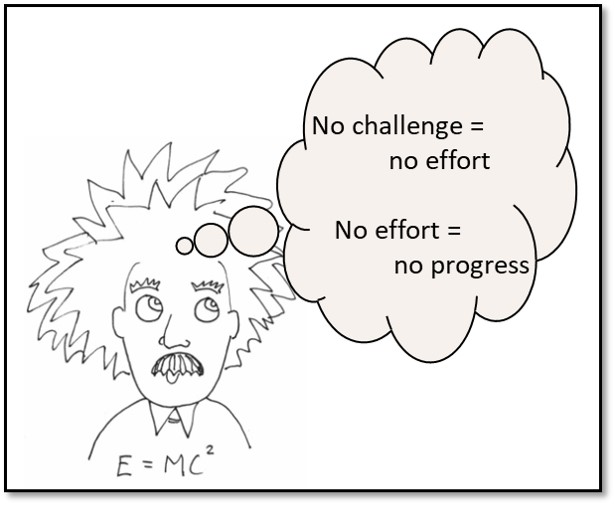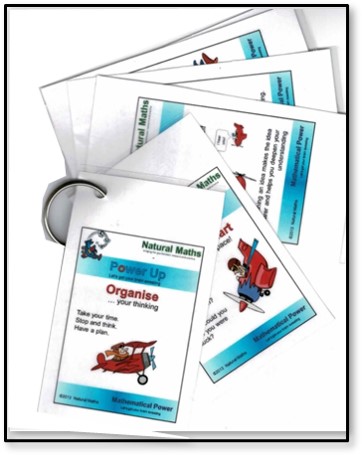POWER UP Blog
June already and most of you are in report writing mode. Best of luck with that.
The following cartoon is my response to a teacher and class that I was privileged to work with last week. Okay I know I’m not the best cartoonist, but I’m having a go and will persist.

Last week I was in a classroom doing a demonstration lesson when I saw a student flip through her key ring of mini Power Up Posters.

I went across to her and she looked up at me and said, “See! I didn’t organize my thinking. I need to go back and make a better plan of what I can try.”
As I looked around, I saw that other students were flipping through their mini keyring Power Up Posters. Why didn’t I think about them being used in that way?
Later the teacher told me that at the reflection at the end of maths lessons she always includes a question about how the students had powered up during the lesson. “Wow!” was all I could say. You all know how much I love clever teachers who take an idea, make it their own, make it match their range of learners and improve on the original in some way.
Over the weekend I went back to review the posters and the original thinking and research that underpinned them. I have decided to share the introduction to the Power UP Poster Pack in this newsletter as a reminder to us all that maths, problem solving in particular is not easy but it is achievable and can be most enjoyable for students if we actively promote appropriate dispositions towards it.
My wish really is that we could put more clever teacher ideas in the limelight. So, if you have anything that you have done with a Natural Maths product that you would like to share, let us know. We will put your name on it or if you prefer as in this case withhold it.
Here is the Introduction to the Power Up Posters. Enjoy, and just in case you like the keyring idea too, we’ve added a slide of the 8 posters to the POWER UP download.
POWER UP Poster Pack Teacher Notes
Ann and Johnny Baker
A common catch cry is that today’s children are overprotected, overpraised and overprovided for (see the article by Alfie Kohn). We were recently running workshops around problem solving and couldn’t help noticing a similar lack of stickability and perseverance on the part of those teachers who ‘never liked problem solving’ or who were ‘never any good at it’. Of course we have all seen similar traits in our students and we felt that it is time to address this maths fear. This fear of maths often manifests itself in a lack of willingness to engage and to struggle with a task. We have all witnessed work avoidance behaviours and heard student’s wail “I don’t know what to do”. All this before they have even paused for a second to stop and think. All too often help is at hand for such students and rather than let them struggle or even worse fail teachers tend to swoop in and guide, tell or take over from the students. Rescue mode and over supportive behaviours may be preventing the students from experiencing success and pride in their effort. Today’s students become tomorrow’s employed and we need to prepare them to be self-regulating in that workplace. What kind of skills and expectations are we providing for them? Will they need recuing and praising at every turn of their work in order to keep going?
Nor is it simply a case of:
“Some people have a maths brain; I have a literacy brain.”
What we know is that with practice any one can improve at maths and at problem solving. Unlike some other countries we generally believe in talent over grit and hard work. Carol Dweck (2006) talks about fixed mindset or growth mindset. Manu Kapur (2008) talks about the importance of productive failure. For a growth mindset we have to believe that we can improve if we make the effort. Indeed, it appears that, “classrooms in which students engage in challenging tasks exhibit the highest learning gains” (Silver and Stein, 1996). By providing cognitively challenging tasks and allowing students to grapple with them in their own ways provides them with success and satisfaction. This type of effort allows students to own the mathematics that they are using and developing (Imm, Stylianou and Chae, 2008).
There is no effort needed unless we provide students with challenging tasks that, yes, they may not have 100% success with.
With all of this in mind we thought that it was time to offer some constructive support that teachers could use as personal prompts and as powerful messages for their students. We have used the acronym POWER UP so that it will be easy to recall each powerful message.
NOTE: this is not a step by step model necessarily and not all parts of the acronym may need to be stepped through every time there is a challenging situation. They do however need to be used until they are automatically thought about on the job. Having said that, it will be beneficial to introduce them in the POWER UP sequence initially. These posters have also been designed to match the STAR Posters so can be used in conjunction with them.
References
Dweck, C. Mindset: The new psychology of success, Random House (2006)
Imm, K. L., Stylianou, D. A. and Chae, N. Mathematics Teaching in the Middle School (`13, April) 458-463 (2008)
Kapur, M Productive failure, Cognition and Instruction 26 (3) 379-424
Kohn, A. Article viewed at http://www.alfiekohn.org/f_news/fullnews.php?fn_id=8
Silver, E. A. and Stein, M. K. Uban Education 30 (4) 476-521 (1996)
